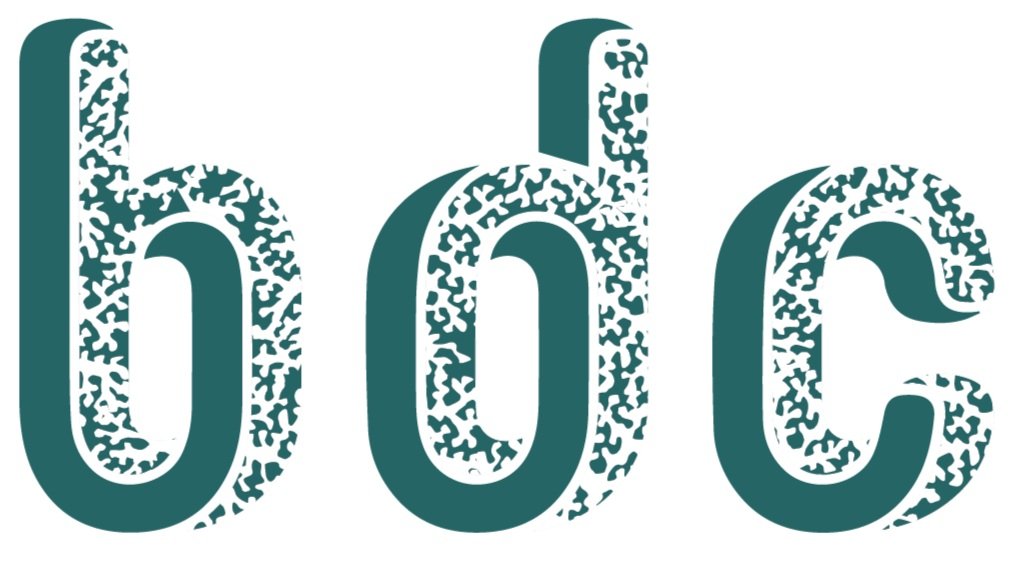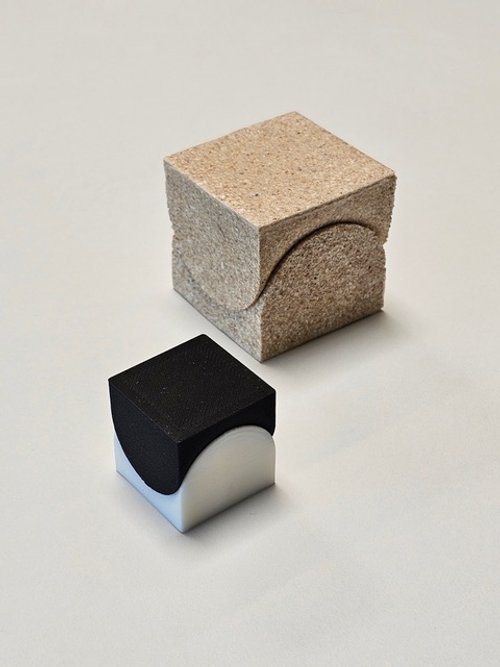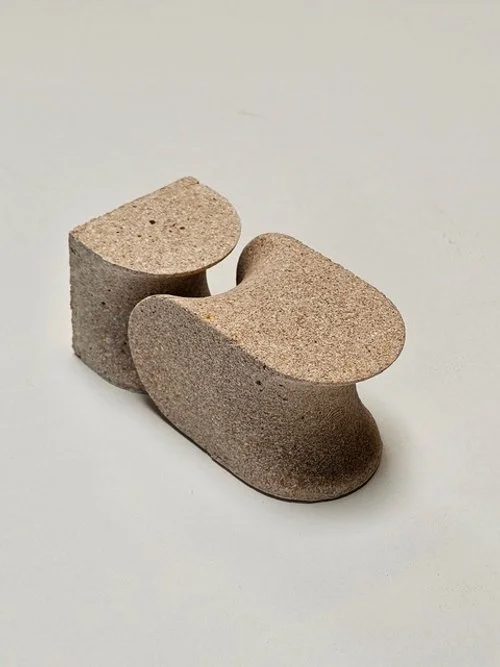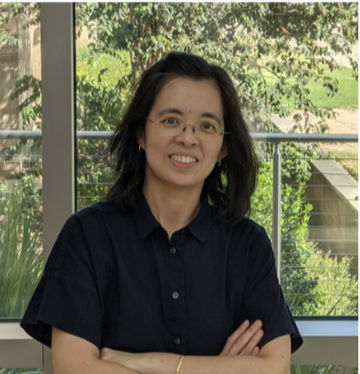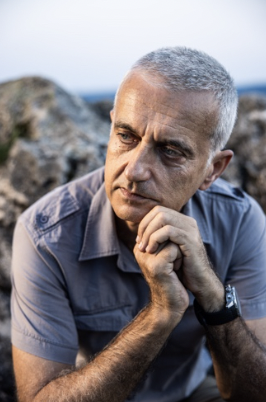California College of the Arts Architecture + University of California, San Francisco
projects 2024
Shell We Dance?
Outstanding Science Winner
Miti Mehta, Negar Hosseini, Kianoush Hamedi, Jesus Guillermo Macias Franco, Alex Hong, Claire Kokontis, Camille Moore
Shell We Dance? transforms the high volume of waste from the consumption of eggs and shellfish in urban environments into a bio-material which is harvested, processed, and fabricated into a new component-based building system. The team developed moldable components and a complimentary adhesive which were tested at multiple scales, looking at the chemical and biological structure of the material, exploring variable formulations and developing ways to enhance the structural capacity with the addition of living bacteria.
Instructors 2024
Margaret Ikeda is an associate professor of Architecture at California College of the Arts (CCA) in San Francisco, California. She is the Integrated Studio Coordinator and has developed the Buoyant Ecologies Studio curriculum which, since 2015, has received five national AIA COTE Top Ten Student Awards for sustainability. Margaret is also a co-founder and co-director of the CCA Architectural Ecologies Lab that serves as a platform for collaborative research between designers, scientists, and manufacturers. The lab merges spatial practice with innovative techniques of material production and ecological research.The most recent project called the Float Lab, is currently moored in the Port of Oakland and designed to test a new type of resilient floating breakwater. In conjunction with the launch of the Float Lab, the Port awarded her with a Community Investment Grant to create an educational book called A Guide to Field Identification, Marine Animals Coloring Book of the San Francisco Bay.
Evan Jones is an Adjunct Professor of Architecture at California College of Arts (CCA) and practicing architect. As co-founder and principal of Assembly, an architecture firm located in Berkeley California, Evan has worked on many scales of projects from furniture and museum installations to landscape planning and multi-story housing projects. Within CCA, he has specialized in integrated design studios focusing on novel design strategies for coastal resilience under the Buoyant Ecologies studio curriculum. This speculative design work has led to the formation of the Architectural Ecologies Lab at CCA (along with fellow professors Margaret Ikeda and Adam Marcus) and the fabrication and deployment of the Float lab in 2019. The Float Lab works with biological fouling to attenuate waves and create ecological habitats. The project received a 2018 Architect Magazine R+D award, a national 2019 AIA Innovation Award, and recently awarded a 2020 ASCA Faculty Design Award.
Dyche Mullins studied electrical engineering and mathematics before becoming fascinated with cell biology during his doctoral work at the University of Kentucky. After postdoctoral work at Johns Hopkins University and The Salk Institute for Biological studies, Mullins joined the faculty at UCSF. Since 2011, Mullins has also been an Investigator of the Howard Hughes Medical Institute. Work in the Mullins Lab focuses on the assembly and regulation of cytoskeletal networks - collections of molecules that self-assemble into complex structures that enable cells to transport molecular cargoes, change their shape, and propel themselves from place to place. Understanding how cells construct these internal molecular 'skeletons' is key to understanding a wide variety of biological processes and human diseases.
Dr. Negar Kalantar is an associate professor of Architecture and a Co-Director of Digital Craft Lab at California College of the Arts (CCA) in San Francisco and co-founder of the transLAB. Her cross-disciplinary research focuses on materials exploration, robotic and additive manufacturing technologies and engaging architecture, science, and engineering as platforms for examining the critical role of design in global issues and built environments. Kalantar is the recipient of several awards and grants, including the Dornfeld Manufacturing Vision Award 2018, the National Science Foundation, Autodesk Technology Center Grant, and X-Grant from the Texas A&M President’s Excellence Fund on developing sustainable material for 3-D printed buildings.
Advisors 2024
Ali Farajmandi is an architectural designer and CCA graduate, specializing in computational design and kinetic structures. With a passion for innovative solutions, Ali thrives in interdisciplinary collaboration. Currently a researcher at Autodesk Technology Center, he brings creative problem-solving to architectural projects, pushing the boundaries of design with expertise in digital crafts and transformable structures.
Anastasia H. Muliana is a Linda and Ralph Schmidt’68 Professor in the Department of Mechanical Engineering at Texas A&M University. She received a PhD degree in Civil Engineering from Georgia Institute of Technology. Her research focuses on understanding physical mechanisms that lead to nonlinear and time-dependent responses in hierarchical structures under multiple stimuli (mechanical, thermal, chemical, electrical, and light). This includes investigating viscoelastic responses of polymer composites, long- term degradation and life prediction of polymers and composites exposed to harsh environments, deformations of adaptive and flexible composite structures, and biomechanical properties of plant stems. She is a recipient of the National Science Foundation CAREER Award, the US Presidential Early Career Awardfor Scientists and Engineers (PECASE) Award, and the William Keeler Memorial Award, among others.
Prof. Alain Goriely is the statutory Professor of Mathematical Modelling at the University of Oxford where he is also the Director of the Oxford Centre for Industrial and Applied Mathematics and a member of Saint Catherine’s College. He is a mathematician with broad interests in mathematical methods, mechanics, sciences, and engineering having authored more than 300 scientific papers and three books. He is well known for his contributions to dynamical systems, mathematical biology, as well as fundamental and applied mechanics. In addition, Alain enjoys scientific outreach based on problems connected to his research, including brain modelling, the mechanics of plants, the shape of seashells, twining plants, umbilical cord and whip cracking. His work has been recognized by a Sloan Fellowship, a Royal Society Wolfson Research Award, the Cozzarelli Prize from the National Academy of Sciences and the Engineering Medal from the Society of Engineering Sciences. He was elected Fellow of the Royal Society in 2022 and Professor of Geometry at the Gresham College in 2024.
Gábor Domokos is a professor in the Department of Morphology and Geometric Modeling at the Budapest University of Technology and Economics where he graduated in 1986 as an architect. In 1989 he obtained a PhD in applied mechanics at the Hungarian Academy of Sciences. In 2007, with Péter Várkonyi he discovered a new geometric shape called Gömböc. After that, his research turned towards the mathematical description of natural shapes. In 2020 he wrote a paper with Doug Jerolmack, Ferenc Kun and János Török discussing Plato’s claim that Earth is made of cubes and showing by geometry by measurements that on average, fragmented rock is actually equivalent to the cube. Recently, Domokos published a preprint with Alain Goriely, Ákos G. Horváth and Krisztina Regős where they identify a new class of shapes called soft cells which tile space without gaps but have no sharp corners. Domokos was visiting professor at Cornell University and a Visiting Fellow Commoner at Trinity College, Cambridge.
